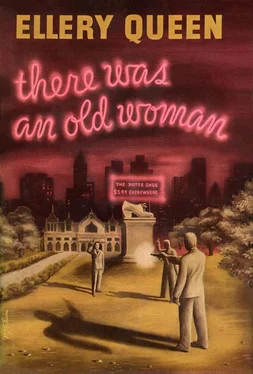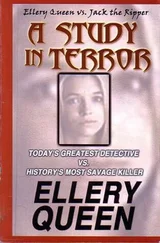“Horatio,” said Charley reverently, “publishes ’em himself, too.”
“Right now I’m writing my major opus, Mr. Queen,” roared Horatio happily. “A new modern version of Mother Goose. It’s going to be my monument, mark my words.”
“Even has his meals served there,” said Charley as they strolled back to the main house. “Well, Ellery, what do you think of Horatio Potts?”
“He’s either the loonist loon of them all,” growled Mr. Queen, “or he’s the only sane man alive on the planet!”
Dinner was served in a Hollywood motion-picture set by extras — or so it seemed to Ellery, who sat down to the most remarkable meal of his life. The dining-room ceiling was a forest of rafters, and one had to crane to count them. Everything was on the same Brobdingnagian scale — a logical outgrowth, no doubt, of the giant that was Pottsism. Nothing less than a California redwood could have provided the one-piece immensity of the table. The linen and silver were heavier than Ellery had ever hefted, the crockery was grander, and the stemware more intricate. The credenza groaned. If the Old Woman was hen of a batty brood, at least she did not make them scratch for their grub. This was the board of plenty.
The twins, Robert and Maclyn, had not appeared for dinner. They had telephoned their mother that they were held up “at the office.”
Cornelia Potts was a not ungracious hostess. The old lady wanted to know all about “Mr. Queen,” and Mr. Queen found himself talking when he had come to listen. If he was to gauge the temper and the sanity of Thurlow Potts, he could not distract himself with himself. So he was annoyed, deliberately. The Old Woman stared at him with the imperial surprise of a woman who has lived seventy years on her own terms. Finally she rejected him, turning to her children. Ellery grinned with relief.
Sheila ate brightly, too brightly. Her eyes were crystal with humiliation. Ellery knew it was for him, for being witness to her shame. For Cornelia ignored her, as if Sheila were some despised poor relation instead of the daughter of her flesh. Cornelia devoted herself almost wholly to Louella, who bothered not at all to respond to her mother’s blandishments. The skinny old maid looked sullen; she ate wolfishly, in silence.
Had it not been for Stephen Potts and his friend Major Gotch, the dinner would have been intolerable. But the two cronies chattered away, apparently pleased at having a new ear to pour their reminiscences into, and Ellery had some difficulty extricating himself from Papuan paradises, Javanese jungles, and “the good old days” in the South Seas.
Thurlow had come to the table bearing two books. He set them down beside his service plate, and once in a while glanced at them or touched them with a glowering pleasure. From where Charley Paxton sat he could read the titles on their spines; Ellery could not.
“What are those books, Charley?” he mumbled.
Charley squinted. “The History of Dueling —”
“History of dueling!”
“The other is A Manual of Firearms.”
Mr. Queen choked over his melon.
During the soup course — an excellent chicken consommé — Ellery looked about and looked about and finally said in an undertone to Charley: “I notice there’s no bread on the table. Why is that?”
“The Old Woman,” Charley whispered back. “She’s on a strict diet — Innis has forbidden her to eat bread in any form — so she won’t have it in the house. Why are you looking so funny?”
Thurlow was explaining to his mother with passion the code of duello, and Major Gotch interrupted to recall some esoteric Oriental facts on the broader subject; so Mr. Queen had an opportunity to lean over to his friend and chant, softly —
“There was an old woman who lived in a shoe,
She had so many children she didn’t know what to do,
She gave them both broth without any bread...”
Charley gaped. “What are you talking about?”
“I was struck by certain resemblances,” muttered Ellery. “The Horatio influence, no doubt.” And he finished his broth in a thoughtful way.
Suddenly Louella’s cricket-voice cut across the flow of table talk. “Mother!”
“Yes, Louella?” It was embarrassing to see the eagerness in the old lady’s face as her elder daughter addressed her.
“I need some more money for my plastic experiments.”
“Spend your allowance already?” The corners of the Old Woman’s mouth sank, settled.
Louella looked sullen again. “I can’t help it. It’s not going just right. I’ll get it this time sure. I need a couple of thousand more, Mother.”
“No, Louella. I told you last time—”
To Ellery’s horror the forty-four-year-old spinster began to weep into the puddle in her consommé cup, weep and snuffle and breathe without restraint. “You’re mean! I hate you! Some day I’ll have millions — why can’t you give me some of my own money now? But no — you’re making me wait till you die. And meanwhile I can’t finish my greatest invention!”
“Louella!”
“I don’t care! I’m sick of asking you, asking you—”
“Louella dear,” said Sheila in a strained voice. “We have guests—”
“Be quiet, Sheila,” said the Old Woman softly. Ellery saw Sheila’s fingers tighten about her spoon.
“Are you going to give me my own money or aren’t you?” Louella shrieked at her mother.
“Louella, leave the table.”
“I won’t!”
“Louella, leave the table this instant and go to bed!”
“But I’m hungry, Mother,” Louella whined.
“You’ve been acting like an infant. For that you can’t have your supper. Go this instant, Louella.”
“You’re a horrible old woman!” screamed Louella, stamping her foot; and, bouncing up from the table, she stormed from the dining room, weeping again.
Mr. Queen, who had not known whether to rise for the woman or remain seated for the child, compromised by assuming a half-risen, half-seated posture; from which undignified position he murmured, but to himself: —
“And whipped them all soundly and put them to bed.”
After which, finding himself suspended he lowered himself into his chair. “I wonder,” he wondered to himself, “how much of this a sane mind could take.”
As if in answer, Sheila ran from the dining room, choking back sobs; and Charley Paxton, looking grim, excused himself after a moment and followed her. Steve Potts rose; his lips were burbling.
“Stephen, finish your dinner,” said his wife quietly.
Sheila’s father sank back in his chair.
Charley returned with a mumble of apology. The Old Woman threw him a sharp black look. He sat down beside Ellery and said in a strangled undertone: “Sheila sends her apologies. “Ellery, I’ve got to get her out of this lunatic asylum!”
“Whispering Charles?” Cornelia Potts eyed him. The young man flushed. “Where is Sheila?”
“She has a headache,” muttered Charley.
“I see.”
There was silence.
5
There Was a Little Man and He Had a Little Gun
From the moment Robert and Maclyn Potts entered the dining room to be introduced to the guest and seat themselves at table, a breath of sanity blew. They were remarkably identical twins, as alike in feature as two carbon copies. They dressed alike, they combed their curly blond hair alike, they were of a height and a thickness, and their voices had the same pleasant, boyish timbre.
Charley, who introduced them, was obviously at a loss; he made a mistake in their identities at once, which one of them corrected patiently. They tackled their broth and chicken with energy, talking at a great rate. It seemed that both were angry with their eldest brother, Thurlow, for having interfered in the conduct of the business for the hundredth time.
Читать дальше












